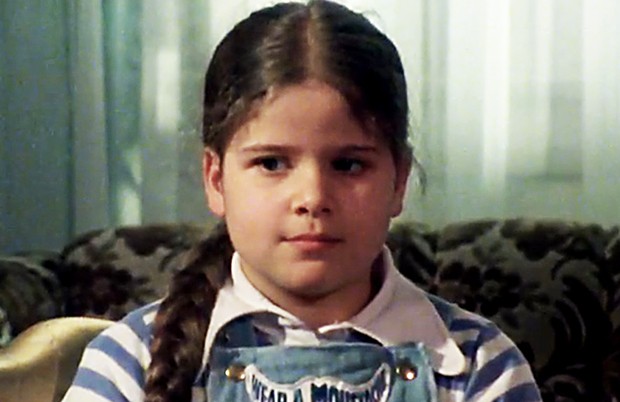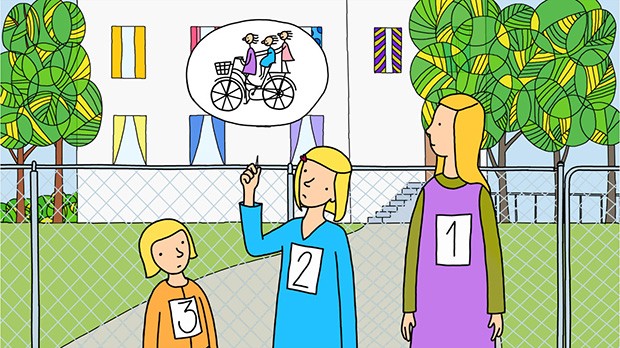And the Oscar goes to … Montreal!
 Concordian Torill Kove was nominated again this year. | Courtesy of National Film Board of Canada
Concordian Torill Kove was nominated again this year. | Courtesy of National Film Board of Canada
Montrealers will be rooting for the home team at the 2015 Oscars.
Our own Torill Kove is nominated (again!) in the animated-short category, this time for her film Me and My Moulton. Kove, who has taught classes in animation at Concordia, won an Oscar in the same category for The Danish Poet in 2007.
If Kove triumphs again, it will be another addition to the odd and fruitful relationship this city has to the Academy Awards.
Here are seven marvellous, odd and otherwise memorable Montreal Oscar moments.
1. The first Academy Award for a short documentary went to a Canadian film
Churchill's Island (1941), made by the National Film Board of Canada (NFB) and directed by NFB co-founder Stuart Legg, is a propaganda film about Britain's fight against the Nazis during WWII.
Though British-born, Legg lived in Montreal at the time.
2. Norman McLaren's legendary animated anti-war film, Neighbours, won — but in the best short documentary category
After a visit to China, Montreal-based McLaren was deeply upset when the Korean War began. He made this anti-war statement, which the Academy loved so much it gave it an Oscar in 1953, the beginning of the Cold War.
It's great that it won, of course, but it's hardly a documentary.
3. I'll Find a Way was the breakthrough film of Studio D, the NFB's women's film unit
In 1974, the late Montrealer Kathleen Shannon pointed out that the NFB had a bad track record for hiring women. She proposed a studio specifically for women directors making films about social issues. But when Studio D was born, many critics argued it was unnecessary and would go nowhere.
In 1978, those critics were forced to eat crow when Montrealer Beverly Shaffer's touching film about a girl overcoming her disability won the Oscar for Best Live Action Short. I'll Find a Way was the first of three for the studio, which would ultimately be shuttered in 1996 due to government cuts.
 The 1977 short documentary film "I'll find a way" features nine-year-old Nadia DeFranco, who has spina bifida and dreams of attending a regular school. | Image courtesy of the National Film Board of Canada
The 1977 short documentary film "I'll find a way" features nine-year-old Nadia DeFranco, who has spina bifida and dreams of attending a regular school. | Image courtesy of the National Film Board of Canada
4. The Reagan administration helped If You Love This Planet to win by labelling it propaganda
In 1982, first-time filmmaker Terre Nash made a stirring documentary portrait of physician and anti-nuclear advocate Helen Caldicott, who was then lecturing extensively about what a nuclear war might actually look like. The Reagan administration officially declared the NFB Studio D film propaganda, limiting its U.S. distribution. But the move backfired, turning the film into acause célèbre.
In her acceptance speech, Nash, a Montrealer, thanked the Reagan administration for the boost in publicity. She later revealed that she had an unusual place for storing the statuette — the bathroom. "I was robbed a few years ago, and they clearly didn't go into the bathroom, since the Oscar was untouched. It turned out to be a good place to keep it after all," she said in 1997.
5. Denys Arcand gave one of the shortest Oscar speeches ever
He had waited patiently for it. After being nominated twice in the Best Foreign Language Film category, the third time turned out to be the charm, when Arcand and his producer and wife Denise Robert took the Oscar home to Montreal in 2004 for Les invasions barbares (The Barbarian Invasions).
Robert joked about being thankful that The Lord of the Rings: Return of the King, which had won nearly every other category, didn't qualify in this one, and then she thanked the expected list of backers and distributors. But all Arcand added to Robert’s speech was a simple, gracious "Thank you.”
When asked about his short speech years later, he said, "I'm a very bad improviser. But, you know, it's not my role. I'm a filmmaker, not a speech writer."
6. Canada won an Oscar for a portrait of an Oscar nominee
In Ryan, Chris Landreth made an animated film about Montreal filmmaker Ryan Larkin, a man who had gone from being an Oscar-nominated NFB animator to an alcoholic panhandler.
This poignant profile of Larkin won the NFB another Oscar in 2005.
 Academy Award nominee Me and My Moulton | Courtesy of Mikrofilm As / The National Film Board of Canada
Academy Award nominee Me and My Moulton | Courtesy of Mikrofilm As / The National Film Board of Canada
7. Montrealer Torill Kove won an Oscar for a quirky, animated, existential short
In 2007, Kove won the Best Animated Short award for The Danish Poet, her off-kilter take on one poet's obsessive rumination on the mysteries of human existence.
Kove studied animation at Concordia and taught animation in the Mel Hoppenheim School of Cinema for several years; she was also nominated in 1999 for My Grandmother Ironed the King’s Shirts.
Check out the 10 biggest Oscar snubs of all time.